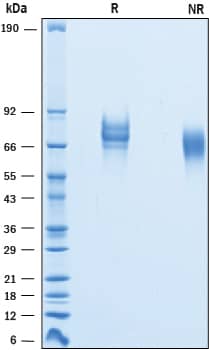Recombinant Mouse L-Selectin/CD62L His-tag Protein, CF
R&D Systems, part of Bio-Techne | Catalog # 10072-LS

Key Product Details
Product Specifications
Source
Trp39-Asn332, with a C-terminal 6-His tag
Purity
Endotoxin Level
N-terminal Sequence Analysis
Predicted Molecular Mass
SDS-PAGE
Activity
When Recombinant Mouse L‑Selectin/CD62L is immobilized at 2 µg/mL (100 µL/well), the concentration of Recombinant Mouse MAdCAM‑1 Fc Chimera (Catalog # 993-MC) that produces 50% of the optimal binding response is 2-12 μg/mL.
Scientific Data Images for Recombinant Mouse L-Selectin/CD62L His-tag Protein, CF
Recombinant Mouse L-Selectin/CD62L His-tag Protein SDS-PAGE
2 μg/lane of Recombinant Mouse L‑Selectin/CD62L was resolved with SDS-PAGE under reducing (R) and non-reducing (NR) conditions and visualized by Coomassie® Blue staining, showing bands at 62-83 kDa.Formulation, Preparation and Storage
10072-LS
| Formulation | Lyophilized from a 0.2 μm filtered solution in PBS. |
| Reconstitution | Reconstitute at 500 μg/mL in PBS. |
| Shipping | The product is shipped at ambient temperature. Upon receipt, store it immediately at the temperature recommended below. |
| Stability & Storage | Use a manual defrost freezer and avoid repeated freeze-thaw cycles.
|
Background: L-Selectin/CD62L
L-Selectin (also known as Leukocyte Selectin, LAM‑1, LECAM-1, LECCAM-1, TQ1, Leu-8, MEL-14 antigen, DREG, lymph node homing receptor, and CD62L), a member of the Selectin family, is a cell surface glycoprotein expressed constitutively on a wide variety of leukocytes. Two forms of L-Selectin have been reported, apparently arising as a result of post-translational modifications. The lymphocyte form shows an apparent molecular weight of 74 kDa, while the neutrophil form is 90 - 100 kDa. Human and mouse L-Selectin share 76% amino acid sequence homology.
L-Selectin plays a role in the migration of lymphocytes into peripheral lymph nodes and sites of chronic inflammation, and of neutrophils into acute inflammatory sites. Acting in cooperation with P-Selectin and E-Selectin, L-Selectin mediates the initial interaction of circulating leukocytes with endothelial cells that produces a characteristic "rolling" of the leukocytes on the endothelium. This initial interaction involving ICAM-1 and VCAM-1 leads eventually to extravasation of the white blood cell through the blood vessel wall into the extracellular matrix tissue.
ELISA techniques have shown that detectable levels of soluble L-Selectin are present in the biological fluids of apparently normal individuals. Furthermore, a number of studies have reported that levels of L‑Selectin may be elevated or lowered in subjects with a variety of pathological conditions.
Alternate Names
Gene Symbol
UniProt
Additional L-Selectin/CD62L Products
Product Documents for Recombinant Mouse L-Selectin/CD62L His-tag Protein, CF
Product Specific Notices for Recombinant Mouse L-Selectin/CD62L His-tag Protein, CF
For research use only
